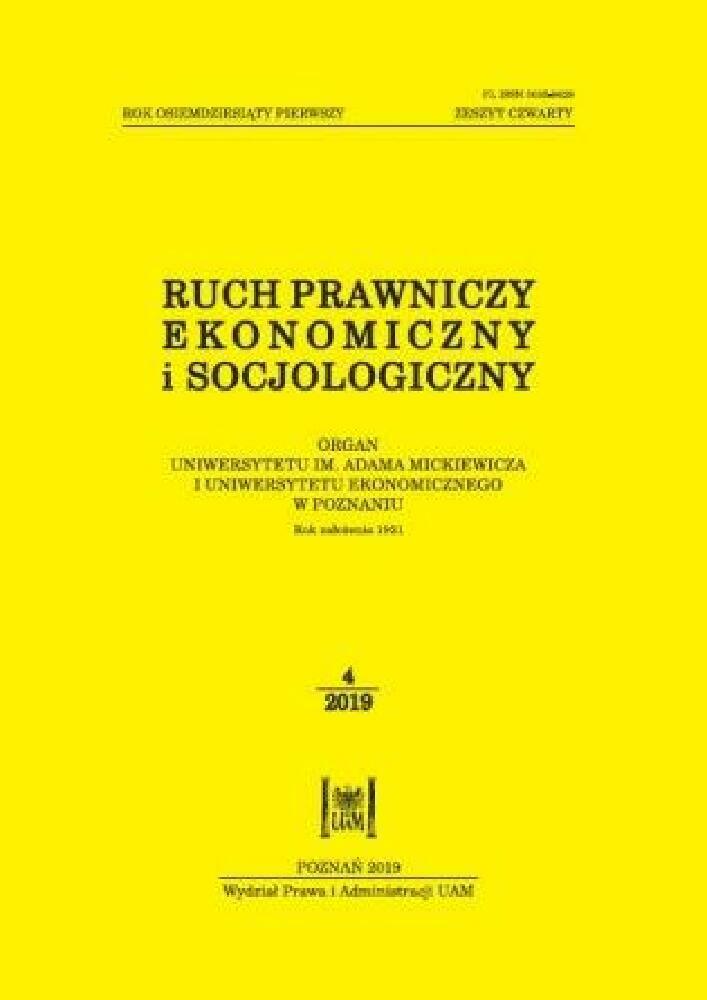Abstract
The aim of this article is to present the distinct political-legal status of a spa commune (gmina) in Poland. With this aim, the considerations focus on the development of legislation on spa communes, which dates back to 1922. Nevertheless, the basis for the considerations relates to the current legal situation. In her article, the author indicates that a spa commune is a municipality of the dual political-legal model: standard and special. The differences are connected with a number of aspects: the area, name, tasks and spa fees charged, the spa commission, the statute and supervisory activity. They result from the specific character of these communes, which is determined by the presence of public tasks connected with providing treatment in health resorts. The conclusion is that there are two pillars on which a spa commune rests: the resource-related aspect – based on the necessity of providing very good sanitary and environmental conditions in resorts, and the human aspect – constituted by tourists. For these pillars to be managed in a proper way, the legislator has decided to grant separate political-legal status to these communes.
References
Augustyniak, M. (2012). Organizacja i funkcjonowanie rady gminy. Warszawa.
Borkowski, J. (1996). Kodeks postępowania administracyjnego – Komentarz. Warszawa.
Dolnicki, B. (1993). Nadzór nad samorządem terytorialnym. Katowice.
Dolnicki, B. (2016). Samorząd terytorialny. Warszawa.
Dudar, G. (2006). Opłata uzdrowiskowa – problemy praktyczne. Przegląd Podatków Lokalnych i Finansów Samorządowych 6: 8–17.
Korczak, J. (2018). Gmina uzdrowiskowa w prawodawstwie polskim. Opolskie Studia Administracyjno-Prawne 16, 1(1): 99–118.
Kosiński, C. (2006). Nadzór administracyjny jako element determinujący zakres samodzielności jednostek samorządu terytorialnego, [w:] C. Kosiński (red.), Nadzór administracyjny. Od prewencji do weryfikacji. Wrocław: 79–116.
Leoński, Z. (2006). Samorząd terytorialny w RP. Warszawa.
Maciejewski, T. (2002). Historia administracji. Warszawa.
Nowak-Far, A. (2010). Miejscowości uzdrowiskowe w Austrii, Czechach, Niemczech i na Słowacji: status prawny i regulacyjne determinanty funkcjonowania. Studia z Polityki Publicznej 2(18): 37–58.
Paczuski, R. (1991). Zagadnienie odrębności prawnoustrojowej samorządów zarządzających sprawami uzdrowisk. Ruch Prawniczy, Ekonomiczny i Socjologiczny 53(2): 85–95.
Paczuski, R. (2015). Ochrona zasobów leczniczych środowiska Rzeczypospolitej Polskiej jako jedna z podstawowych form zarządzania ochroną środowiska przy respektowaniu zasady zrównoważonego rozwoju. <https://repozytorium.uwb.edu.pl/jspui/bitstream/11320/3440/1/BSP_18_2015_Paczuski.pdf>.
Sikora, K. (2014). Szczególny status gmin uzdrowiskowych w Polsce. Studia Iuridica Lublinensia 23: 107–124.
Trzcińska, D. (2018). Ochrona środowiska a status uzdrowiska w świetle prawa planowania przestrzennego. Opolskie Studia Administracyjno-Prawne 16, 1(1): 155–164.
License
Copyright (c) 2019 WPiA UAM

This work is licensed under a Creative Commons Attribution-NonCommercial-NoDerivatives 4.0 International License.





